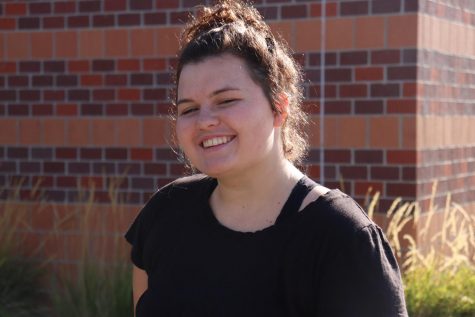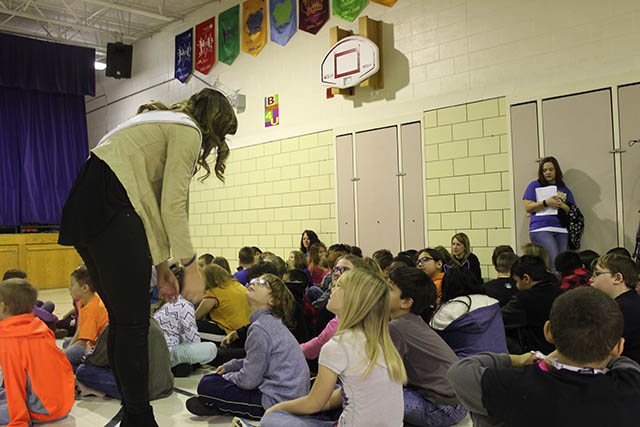Misfortune to Miss Nebraska
Aleah Peters, Miss Nebraska, speaks to students about cyberbulling.
Whether it’s through sending a hurtful text or taking an unflattering picture of someone and spreading it through social media, half of teens have experienced some form of cyberbullying. Cyberbullying is an everyday problem amongst young people including Aleah Peters, also known as Miss Nebraska. She, like many of us, has faced the stumbling block that is cyberbullying.
Peters has built her platform on her experiences. “When I was a freshman in high school, there was a girl a grade ahead of me. We looked a lot alike and she thought the school wasn’t big enough for very similar people,” Peters said. She began getting calls weekly. “It was humiliating because I was the only one on my end of the phone and the girls on the other end of the line were ganging up on me, tearing me down and criticizing every area of my life,” she said.
During her freshman year of high school, the bullying followed Peters to school and outside activities. She remembers one baseball game in particular. “There was a song that they were chanting at me from a few rows back and now I will never forget the lyrics to The Real Slim Shady,” she said. The harassment continued throughout her freshman year. She never told anybody about it because she was embarrassed. “I went into the counselor’s office at the end of the school year to change a class. She asked me how the year had been going and I sat down and told her everything that had been going on,” she said. She worked things out after her freshman year, but it took a while for her to heal. “I’d tell them that I forgive them and I’m thankful for what I went through. I learned a lot about myself. I know who I am and I am confident in who I am now because of it,” she said.
Now Peters travels around the state spreading the word about cyberbullying and offers advice to those who are going through a similar experience. “Looking back, I remember things in high school being such a big deal. People try to brush it off, but you care. You care who’s dating who. You care who is homecoming queen. You care who the best athlete is and I wish I could’ve told myself nobody remembers those things. I can’t tell you who was homecoming queen or the best athlete, but I can tell you who treated me the best and the people I loved to be around because of it,” Peters said. She wants people to know that our words have weight and that what we say in any setting, even if it’s online, matters.
“More than anything, there is power in your interaction and there is power in your words,” Peters said. As we carry out our day-to-day interaction online, we have to think about the things we say. She said “Online is still real life. Kids post online without thinking but that’s tied to you forever,”. She said that kids bully differently online. They think their words have different weight. “Some of the things that are said online, you would never say in person,” Peters said.
Peters also spoke out to the bystanders. “If they retweet or reshare, they become bullies as well,” Peters said. As digital natives, we have a responsibility for what we see and say online. “If you’re seeing this happen and not doing anything about it, you’re also responsible,” she said. Instead of joining, there are other options. “If you’re bystander, reach out to the person that is hurting and stick up for them,” she said.
After her experience, Peters has lot of advice to give but the biggest thing she wants high schoolers to take away from her message is, “Understand the influence that you can have, especially if you are in a leadership role in your school. If you are well liked or respected among your school, use that for good. Use that to make people’s lives better.”

Josie Koubek ('18)
Social Media Editor
I'm a serious student who loves to get laughs. I've been on the Bulldogger for two years.
Favorite memory:
When...

